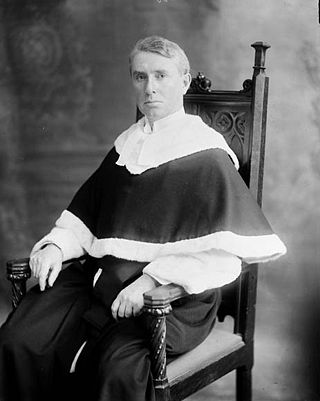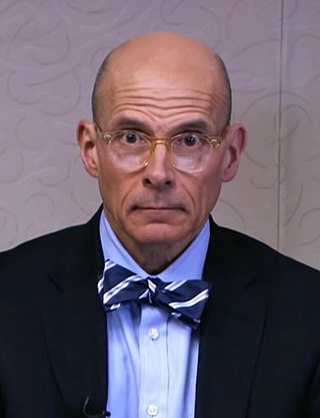In legal terminology, a complaint is any formal legal document that sets out the facts and legal reasons that the filing party or parties believes are sufficient to support a claim against the party or parties against whom the claim is brought that entitles the plaintiff(s) to a remedy. For example, the Federal Rules of Civil Procedure (FRCP) that govern civil litigation in United States courts provide that a civil action is commenced with the filing or service of a pleading called a complaint. Civil court rules in states that have incorporated the Federal Rules of Civil Procedure use the same term for the same pleading.
A deposition in the law of the United States, or examination for discovery in the law of Canada, involves the taking of sworn, out-of-court oral testimony of a witness that may be reduced to a written transcript for later use in court or for discovery purposes. Depositions are commonly used in litigation in the United States and Canada. They are almost always conducted outside court by the lawyers themselves, with no judge present to supervise the examination.

The term magistrate is used in a variety of systems of governments and laws to refer to a civilian officer who administers the law. In ancient Rome, a magistratus was one of the highest ranking government officers, and possessed both judicial and executive powers. In other parts of the world, such as China, magistrate is a word applied to a person responsible for administration over a particular geographic area. Today, in some jurisdictions, a magistrate is a judicial officer who hears cases in a lower court, and typically deals with more minor or preliminary matters. In other jurisdictions, magistrates are typically trained volunteers appointed to deal with criminal and civil matters in their local areas.

Discovery, in the law of common law jurisdictions, is a pre-trial procedure in a lawsuit in which each party, through the law of civil procedure, can obtain evidence from the other party or parties by means of discovery devices such as interrogatories, requests for production of documents, requests for admissions and depositions. Discovery can be obtained from non-parties using subpoenas. When a discovery request is objected to, the requesting party may seek the assistance of the court by filing a motion to compel discovery.
In the law of the United States, a special master is generally a subordinate official appointed by a judge to ensure judicial orders are followed, or in the alternative, to hear evidence on behalf of the judge and make recommendations to the judge as to the disposition of a matter. The special master should not be confused with the traditional common law concept of a master, a judge of the High Court entrusted to deal with summary and administrative matters falling short of a full trial.
The law of evidence, also known as the rules of evidence, encompasses the rules and legal principles that govern the proof of facts in a legal proceeding. These rules determine what evidence must or must not be considered by the trier of fact in reaching its decision. The trier of fact is a judge in bench trials, or the jury in any cases involving a jury. The law of evidence is also concerned with the quantum (amount), quality, and type of proof needed to prevail in litigation. The rules vary depending upon whether the venue is a criminal court, civil court, or family court, and they vary by jurisdiction.
Public Citizen Litigation Group is a public interest law firm in the United States.The group is the litigation arm of the non-profit consumer advocacy organization Public Citizen. Its attorneys work on cases involving health and safety regulation, consumer rights, separation of powers, access to the courts, class actions, open government, and the First Amendment.
Electronic discovery refers to discovery in legal proceedings such as litigation, government investigations, or Freedom of Information Act requests, where the information sought is in electronic format. Electronic discovery is subject to rules of civil procedure and agreed-upon processes, often involving review for privilege and relevance before data are turned over to the requesting party.

Jerome A. Holmes is an American lawyer serving as the Chief United States circuit judge of the United States Court of Appeals for the Tenth Circuit. He is the first African American to serve on the Tenth Circuit.
Honeywell, Inc. v. Sperry Rand Corp., et al., 180 U.S.P.Q. 673, was a landmark U.S. federal court case that in October 1973 invalidated the 1964 patent for the ENIAC, the world's first general-purpose electronic digital computer. The decision held, in part, the following: 1. that the ENIAC inventors had derived the subject matter of the electronic digital computer from the Atanasoff–Berry computer (ABC), prototyped in 1939 by John Atanasoff and Clifford Berry, 2. that Atanasoff should have legal recognition as the inventor of the first electronic digital computer and 3. that the invention of the electronic digital computer ought to be placed in the public domain.
The terms legal case management (LCM), legal management system (LMS), matter management or legal project management refer to a subset of law practice management and cover a range of approaches and technologies used by law firms and courts to leverage knowledge and methodologies for managing the life cycle of a case or matter more effectively. Generally, the terms refer to the sophisticated information management and workflow practices that are tailored to meet the legal field's specific needs and requirements.

In United States federal courts, magistrate judges are judges appointed to assist U.S. district court judges in the performance of their duties. Magistrate judges generally oversee first appearances of criminal defendants, set bail, and conduct other administrative duties. The position of "magistrate judge" or "magistrate" also exists in some unrelated state courts.

Paul William Grimm is a former United States district judge of the United States District Court for the District of Maryland.

Francis Marion Allegra was an American federal judge on the United States Court of Federal Claims.

Einstein v 357 LLC is a United States New York Supreme Court landmark decision which addresses a party's discovery obligations and the safeguarding of evidence. In particular, this decision addresses the issue of the intentional destruction of digital evidence when litigation has commenced or is reasonably anticipated. In short, this decision eradicates the excuse of ignorance in terms of how electronically stored information is saved, deleted, and retrieved.

Jennifer Guerin Zipps is an American lawyer and judge serving as a United States district judge of the United States District Court for the District of Arizona. Zipps formerly served as a United States magistrate judge of the same court from 2005 to 2011.
Gates Rubber Company v. Bando Chemical Industries, Ltd., et al. is a decision by the U.S. district court for the District of Colorado from May 1, 1996. It is considered a landmark decision in terms of expert witness court testimony in questions of electronic evidence and digital forensics.
Microsoft Corp. v. United States, known on appeal to the U.S. Supreme Court as United States v. Microsoft Corp., 584 U.S. ___, 138 S. Ct. 1186 (2018), was a data privacy case involving the extraterritoriality of law enforcement seeking electronic data under the 1986 Stored Communications Act (SCA), Title II of the Electronic Communications Privacy Act of 1986 (ECPA), in light of modern computing and Internet technologies such as data centers and cloud storage.
Maura Robin Grossman is a research professor and former director of Women in Computer Science in the David R. Cheriton School of Computer Science at the University of Waterloo. She also is principal of Maura Grossman Law. Previously, she was Of Counsel at Wachtell, Lipton, Rosen & Katz, where she pioneered the use of technology-assisted review (TAR) for electronic discovery.
Christopher J. Burke is a United States magistrate judge of the United States District Court for the District of Delaware.








